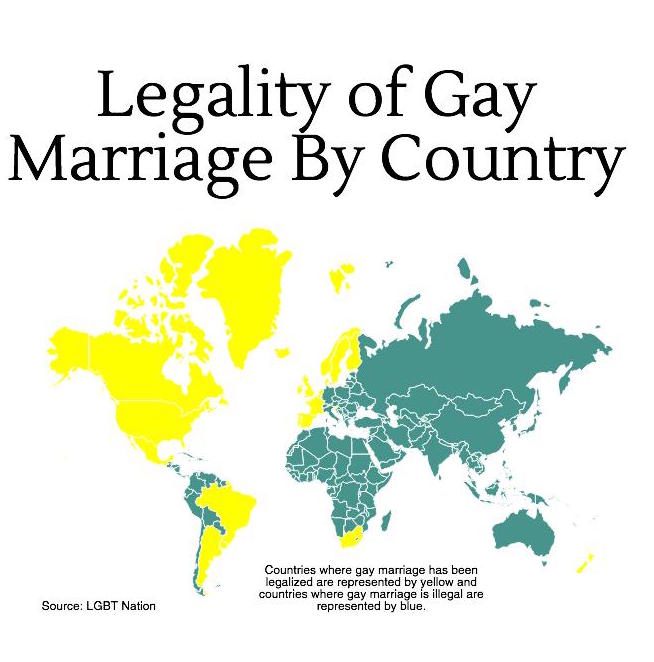Story by Tatum Spurck
Why is the United States, the land of the free and opportunities, ranked 16th in terms of social progression? Many argue it is because of less progressive laws.
According to Social Progress Imperative, the United States performs well in the Nutrition and Basic Medical Care, Access to Basic Knowledge and Advanced Education categories. Despite those positive attributes, the United States is still lacking in Personal Safety, Health and Wellness, and Tolerance and Inclusion.
But how could that be? The United States is in an era of progression. In recent years, laws have been introduced to further rights for the minority population, but other countries have practiced these laws for years.
In 2000, the Netherlands legalized same sex marriage, being the first country in the world to do so. Gallup.com reports that 87 percent of the Nederlanders believe the Netherlands is a great place for LGBTQ communities to thrive.
On June 26, 2015, the United States legalized gay marriage. According to pewforum.com, 55 percent of Americans support gay rights in 2016. This is a 20 percent increase since 2001.
Both the Netherlands and the United States have laws protecting members of the LGBTQ community from hate crimes. In 2009, the US introduced the Matthew Shepard and James Byrd, Jr. Hate Crimes Prevention Act. This act gives a victim of discrimination the power to persecute their perpetrator. The HumanRightsCampaign.org said the law protects people from discrimination based on “race, color, religion, national origin, gender, sexual orientation, gender identity or disability.”
The equivalent to this law in the Netherlands is the ‘1994 Equal Treatment Act.’ This law protects members of the LGBTQ community, as well as people of different religions, races, and political views.
The Netherlands also has fairly lenient drug policies. Marijuana and other “soft drugs” are sold in coffee shops. The Opium Act of 1976 differentiated the effects of “soft drugs” versus “hard drugs”, concluding that “hard drugs”, such as heroin, were far more straining psychologically and physically than marijuana.
The Dutch tolerates the use of marijuana because, according to Amsterdam.info, criminalizing it would be similar to the prohibition of alcohol from 1919-1933 in the United States. During the Prohibition, increased criminal activity occurred, and negatively impacted societal changes.
The United States is slowly beginning to legalize marijuana. California, Colorado, Washington, Alaska, and Oregon have legalized the recreational use of the plant, where other states, such as Arizona, New Mexico, Montana and others, have legalized medicinal use.
“How will I pay for college?” is a common thought and fear amongst many Americans. The College Board says an average in-state tuition is nearly 10 thousand dollars per year and near 25 thousand dollars per year for out of state tuition. Many people can not pay these fines, and are unable to go to college, or are faced with loads of debt.
In Germany, all public colleges are free to both residents and people traveling internationally, reports CNN. Other countries, such as Iceland, Norway, and Finland also have free public colleges. These countries want a more educated population, and to encourage this, they permit free higher education.
Euthanasia, or assisted suicide, is a heavily debated topic. Belgium legalized the act in 2014, and other countries like Canada followed. The purpose of assisted suicide is to help put victims out of their misery, both physical and psychological. In Switzerland, assisted suicide has been practiced since 1942, but is technically illegal. The law states, “Whoever, from selfish motives, induces another to commit suicide or assists him therein shall be punished, if the suicide was successful or attempted, by confinement in a penitentiary for not more than five years or by imprisonment.” The way doctors get around this law is proving they are helping someone conclude their life without any ulterior motives, said Patientsrightscouncil.org.
In the United States, there are six states that have legalized euthanasia: California, Colorado, Montana, Oregon, Vermont, and Washington. Oregon was the first American state to legalize euthanasia. On Oct. 27, 1997, Oregon put into effect the Death with Dignity act which only allows terminally ill Oregon citizens to end their lives through lethal medications.
The difference between the United States’ and the before mentioned country’s euthanasia laws is that in the United States, one must be terminally ill in order to receive euthanasia, and elsewhere, there are no physical requirements, but the patient must be consenting.
To conclude, it seems as though the United States has implemented scaled down versions of many laws common in other countries. Perhaps in the future as society progresses and develops new ways of thinking, laws in the US will be similar to laws elsewhere.















